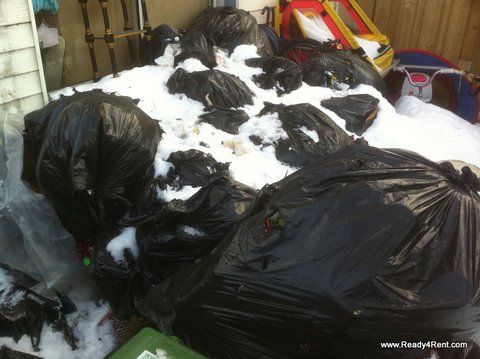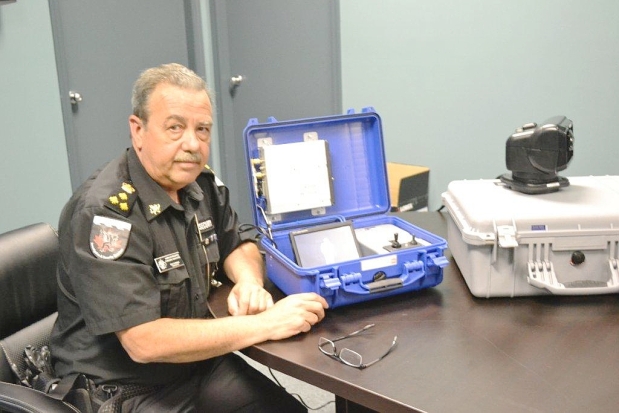When things go wrong don’t expect any help from the government
July 2011

Late payments, a mountain of garbage building up, the tenants lying about us going through their personal things, strangers coming in and out of the property through the windows, the police monitoring the property…it was getting to be too much!I knew I needed to take a step back and hire professional help.
Fortunately through the Ontario Landlords Association I knew where I could find good help. I contacted John Schutten from a local property management firm called Ready4Rent and asked him to take over.
John gave proper notice and did his initial inspection of the property. He went in and inspected for any maintenance or safety issues and took photos. Like so many unruly tenants who have no respect either for the property or their own safety John found they had removed all the smoke alarms, were storing motorcycles in the house, had ripped off all the screens from the window and the place was a mess!
As a true professional, John communicated with the tenants and gave them an opportunity to change their behavior and start following some maintenance and safety rules. The result? They didn’t listen, continued to ignore the rules and continued their destruction of my property.
John had asked me what I wanted to do- I said I wanted them out. I couldn’t trust them, I was suspicious of their drug activities, the place was becoming a fire-trap, they were wrecking my once beautiful home…I wanted them gone.
Since the Fall I was getting the rent paid by Ontario Works (welfare) every month. On March 1 the money stopped. No direct payment. Not a cent. I immediately contacted the welfare fraud department. A while later I received a call from their case worker. This case worker was different than the one I spoke to in the Fall.
She wouldn’t tell me very much because she said her hands were tied by the Privacy Act. I told her the tenants were paying me via Ontario Works with a direct cheque, and it suddenly stopped. The tenants were doing something else with their welfare check. She told me this was not a fraud situation. Tenants on welfare are able to stop their check going directly to the landlord with a quick phone call. She said fraud was only for situations where the welfare recipient was working under the table, claiming other people under them, etc.
I asked the case worker, “So you are telling me that failure to pay rent with the shelter allowance part of a welfare check isn’t fraud?” The rent portion of their cheque is a shelter allowance, and these tenants were spending it on things other than for shelter!
I asked her what happens if they don’t pay rent and I report it. She told me she could hold back the cheques until they produce a rent receipt. I asked her “what happens if they produce a fake receipt?” She answered it was not her job to decipher whether or not a receipt is fake or not! She also said the tenants might be using up their last month’s rent and might move out. My fingers were crossed!
After I finished with the case worker I felt very suspicious the tenants were going to issue a fake rent receipt so they could keep getting their shelter allowance while living in my house rent free. I emailed the Ministry of Social Services explaining my situation and looking for help. Here’s the response I got back:
“Thank you for your e-mail to the Ministry of Community and Social Services regarding your tenant.
When a tenant who is receiving social assistance is not paying rent, the local Ontario Works or Ontario Disability Support Program (ODSP) offices may direct part of a social assistance recipient’s assistance to a third party, such as a landlord or utility company in order to cover rent or utility costs. These pay direct arrangements may remain in effect until it is evident that the recipient is able to manage their financial assistance.
A pay direct arrangement is purely an administrative arrangement that does not change the landlord-tenant relationship or any existing legal obligations. In particular, under this administrative arrangement, the Ministry of Community and Social Services does not take on any of the tenant’s legal or financial obligations.”
And here was my response…..
“I am most insulted with this lame reply.
I am not the first landlord to tell you about the scamming that is going on with regards to tenants having their cheques redirected to themselves only to turn around and use that money for other uses other than its intended purpose- which is to pay for the necessary rent.
Your hands-off approach, with the “it’s a landlord-tenant problem” is getting real old and tiresome.
This email is completely unacceptable as a response…you are the welfare fraud department- THIS IS WELFARE FRAUD!
What does a tenant have to do before they are investigated or charged with misappropriation of funds?
Perhaps the welfare fraud department is really just a make-work project by the current liberal government who treat landlords as second-class citizens? I realize with these types of comments such as yours, there are no real efforts to stop this complete waste of taxpayers money. I will forward this email on to the appropriate people.”
My head was spinning over the situation. Not only were the tenants wrecking my house, potentially doing illegal activities, the police involved, …I was facing months of them living there rent-free! The government didn’t care and was on the tenants side!
I began to investigate how OW and OPSP really work in Ontario. Here is what I found out:
-A welfare or ODSP recipient can have their cheques redirected back to themselves at any time with one simple phone call requiring no explanation whatsoever!
-If the pay-direct cheque is coming to you, and it comes late, OW will NOT even confirm to say whether or not the cheque is in the mail!
-If the cheques stop coming, and the tenant goes into rental arrears, the case worker nor welfare fraud department does not care, and will always have the landlord eat the costs
-It has also happened where the tenant did NOT ask for the cheques to be stopped going to the landlord, yet the tenant received the cheque because the case worker made a mistake- too bad, so sad for the landlord, right?!
-Many welfare recipients have more than one address and cheques go to many of these addresses- yet again OW and welfare fraud turn a blind eye!
-Even after the tenant moves out, sometimes the cheques keep coming- yet again no clue for welfare administration – no checks and balances
-Case workers do NOT check with the landlord to validate any information, a tenant can say they are moving out, when they haven’t, and OW has the right to put a stop payment on a pay direct rent cheque- no warning to the landlord of course!
-Welfare fraud department will not follow up with landlord who has reported welfare fraud
I was learning fast.
Thank God, because things were about to take another turn. The tenants said they might agree to move…or maybe not….



















